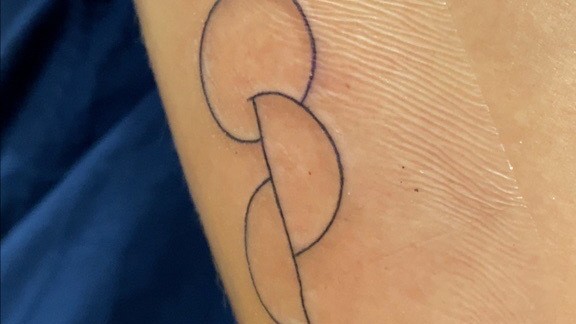The needle is drawn, ink is dripped into small pots and the machine begins to hum monotonously. So Andrei Catalin prepares the following assault in the White Gate tattoo studio in the Glockenbach district. Strictly speaking, tattooing is a criminal offense under Section 223 of the Criminal Code. However, the assault that follows is intended to save lives.
In Germany, around 8,500 people were urgently waiting for a donor organ in 2022, but only 869 people donated organs. Last year, 826 names disappeared from the waiting list, it was too late for them. The reason: lack of donor organs. 84 percent of Germans are willing to donate organs after their death, but only 0.001 percent actually become donors.
Anyone who follows the causal chain further will find a clear reason for the grievance, namely the so-called opt-in regulation, or decision-making solution. In Germany, one automatically becomes a donor only if one has submitted a clear written declaration before one’s death. This only works if you carry a completed organ donor card with you or by living will – which rarely happens.
The Munich initiative “Young Heroes” led by managing director Angela Ipach wants to combat the problem with a tattoo design called “Opt.ink” (based on the opt-in rule), which is intended to symbolize approval for organ donation. The advantage: In contrast to the donor card, you always have your own skin with you.
Wilson Ochsenknecht also has the tattoo
Andrei Catalin routinely guides the needle over the skin, which now shows the motif: a circle and two semicircles. A symbol of how two incomplete parts can become a whole. Catalin has already done this tattoo about 200 times. Because it’s free and the crowd is great, the Munich tattoo studios participating in the campaign have to limit the dates. The campaign gets a lot of attention, including on social media. Celebrities like Joko Winterscheidt, Klaas Heufer-Umlauf or Jürgen Vogel help with the distribution. Wilson Ochsenknecht even has the tattoo on his forearm himself.
The tattoo is free.
(Photo: SZ)
The health ministries and the Federal Center for Health Education (BZgA) are clear: the tattoo is not official. A tattoo is not a legally binding declaration of intent. If the consent is changed, the effort involved in changing the tattoo is also great. The fact that the approval was not signed by the wearer himself, but by a third party, is also given as a reason.
One could check the willingness to donate organs in a central register in which all citizens can easily record their attitude towards organ donation. A measure from the 2021 revised Transplantation Act. The registry was supposed to have been active since March of last year, but the start date has since been pushed back to 2024.
In fact, for many of Catalin’s clients, the organ donation tattoo was their first ever. His own skin, on the other hand, looks unusually undecorated for a tattoo artist, and he doesn’t have the “Opt.ink” either. But he brings the subject of organ donation with his work in the conversation. Eleven Munich studios are involved in the initiative.

